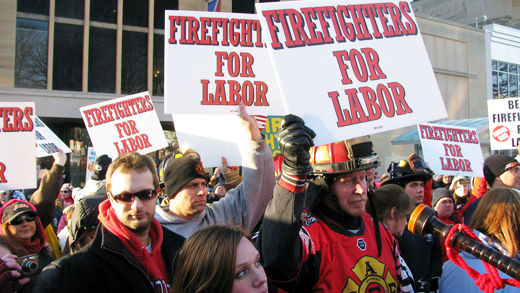
Republican presidential nominee Mitt Romney has told an employee organization, the Fraternal Order of Police (FOP), that “I will oppose” expanding collective bargaining rights for public workers if he wins the White House.
Romney’s statement, in a written response to an FOP questionnaire, is in line with his attempt, as Massachusetts governor, to strip Fire Fighters and police officers throughout the state of their collective bargaining rights.
It’s also in line with current policy pushed in Republican-run states, notably Ohio and Wisconsin, to strip state and local workers of all collective bargaining rights. Romney backed the efforts. Labor beat back the attempt in Ohio, through a referendum that restored collective bargaining, by a 61%-39% margin, but it lost in Wisconsin.
FOP sent a wide-ranging questionnaire on workers’ issues to both Romney and incumbent Democratic President Barack Obama. One key question stated FOP’s support for the Employee-Employer Public Safety Cooperation Act, legislation pushed in Congress – principally by the Fire Fighters – to tell those states that ban collective bargaining with public safety workers that they cannot do so.
Obama supports the bill, said he would sign it when it reaches him, and reminded FOP he cosponsored it while he was a senator from Illinois. Romney said he opposes the legislation, but tried to soften his stand by surrounding it with praise for the FOP and a promise to “consult” with “all stakeholders” about other issues.
“I disagree with the Fraternal Order of Police on this point,” Romney wrote. “I believe labor unions – including public employee unions – can be constructive forces in our communities and I would look forward to working closely with them as president.” But he then quoted FDR, of all people, as saying collective bargaining “cannot be transplanted into the public service.”
“I agree with this view, and I would not support an expansion of collective bargaining rights for public employees,” Romney wrote.
Romney and Obama also split on whether first responders facing discipline by top brass should have due-process rights, another piece of legislation pushed by FOP. And they split, too, on pensions for public workers. Obama, again, was for due process, without any qualifications, and said he “supports continuation of defined benefit” – traditional – “pensions for all federal law enforcement employees.”
Romney would leave due process for the first responders up to state and local governments, and wants to shift the workers into “defined contribution” pensions, which he claims would be less costly to taxpayers. Workers take the risk on those plans.
“I do not believe it is the place of the federal government to impose specific processes or standards on state and local governments,” he wrote. “Local communities should be responsible for the management of their own public safety institutions, and I expect such local control will ultimately benefit not only the communities but also the law enforcement officers who serve them.
“Defined contribution (pension) plans help to control costs and protect future taxpayers, offer employees greater flexibility and choice, and avoid situations in which unfunded liabilities threaten both government budgets and retirement security. I would not seek to use the power of the federal government to prevent state or local governments from making this transition,” Romney added.
Independent studies have shown that, with few exceptions, unfounded public worker pension liabilities do not threaten budgets. The threats come from declining state income tax and local property tax revenues, due to the Great Recession.
Photo: Peoplesworld












Comments